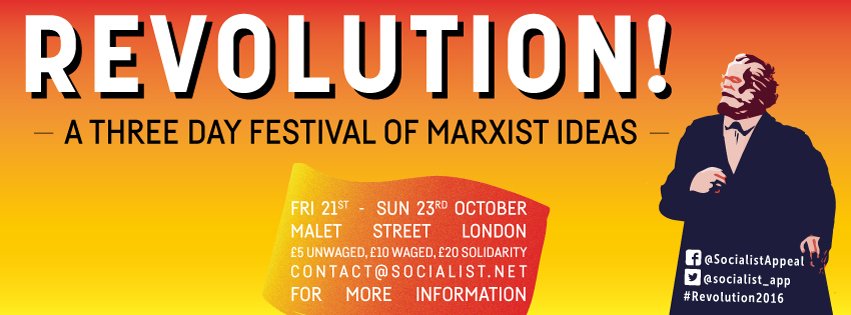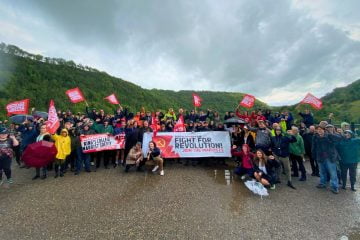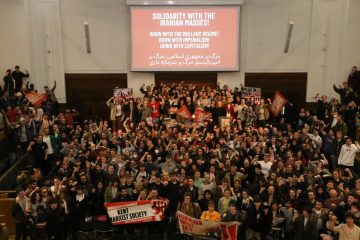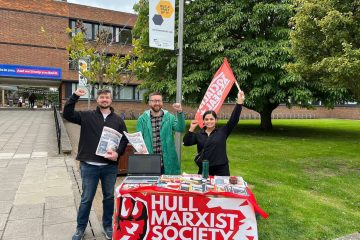
The Marxist Student Federation, Socialist Appeal and the International Marxist Tendency invite you to REVOLUTION! – a three day festival of Marxist ideas.
Across the world, it is clear that the status quo has failed and the system has broken: from the refugee crisis to the earthquake of Brexit; from the ever-growing inequality in society to the civil war inside the Labour Party; and from the rise of Trump in the USA to the seemingly endless conflict in Syria.
Now more than ever, therefore, there is a need for revolutionary change and a socialist alternative.
Join us to discuss the lessons of history and the relevance of Marx’s ideas in offering a way forward.
Visit www.socialist.net/revolution-a-three-day-festival-of-marxist-ideas.htm to book a ticket now!
—————————————-
Friday 21 October
2pm – 5pm
a) Marx in London – guided tour (Meet at UCL)
Karl Marx spent many years of his life in London, where he wrote Capital and many other Marxist classics. Join us for a guided tour of Soho and Bloomsbury to see the places that Marx lived and worked and to sample some of the revolutionary history of London.
b) Lenin in London – guided tour (Meet at Kings Cross)
Vladimir Lenin spent time living and working in London, attending Bolshevik congresses and writing some of his classic texts. On the 99th anniversary of the Russian Revolution join us for a guided tour of Lenin’s London.
7pm-9pm
Trotsky’s biography of Stalin – book launch with guest speaker Esteban Volkov, Leon Trotsky’s grandson (Institute of Education, Russell Square)
On 20th August 1940 Trotsky’s life was brutally ended when a Stalinist agent brought an ice pick crashing down on his head. Among the works left unfinished was the second part of his biography of Stalin.
Trotsky’s Stalin is unique in Marxist literature in that it attempts to explain some of the most decisive events of the 20th century, not just in terms of epoch-making economic and social transformations, but in the individual psychology of one of the protagonists in a great historical drama. It is a fascinating study of the way in which the peculiar character of an individual, his personal traits and psychology, interacts with great events.
Painstakingly restored over a ten year period, in consultation with the Harvard archives and previous English, French and Russian editions, Wellred Books, the publishing house of the International Marxist Tendency has published the most complete version of Trotsky’s final work in any language. This book will contain 100,000 words of original, never-before-published material by the Marxist revolutionary – a 30% increase on the 1946 edition.
This meeting will be addressed by Esteban Volkov, Leon Trotsky’s grandson, who was present at the time of Trotsky’s assassination and who has been fighting for Trotsky’s ideas his entire life.
—————————————-
Saturday 22 October (all meetings in the Student Centre, formerly ULU, on Malet Street)
11am – 1pm
a) What will socialism look like?
Marxism is not a crystal ball, but it is a science and it allows us to make certain predictions about the future. Based on our understanding of capitalism and its contradictions, what can we say about what life would be like without those contradictions? From the economy, to science and technology, to the state – what would socialism look like?
b) Women, the family and the Russian revolution (Emily Cosentino, UWE Marxists)
The situation of women in Russia was greatly advanced by the revolution in 1917. What steps forward were taken by the Bolsheviks in relation to women and the family? Why was this possible after the revolution and what does it tell us about our task in relation to the emancipation of women today?
c) Corbynomics, Keynesianism and capitalist crisis (Adam Booth, editor of www.socialist.net)
Jeremy Corbyn and John McDonnell want to offer an alternative to austerity policies, and their ideas sound very similar to classical Keynesian economic ideas. What is Keynesianism? What exactly are Corbyn and McDonnell proposing? And does it actually offer an alternative to capitalist crisis and austerity?
2pm – 4pm
a) What is Trotskyism? (Jorge Martin, editorial board of America Socialista)
Trotskyism has been prominent in the news recently, as the Labour establishment is claiming that Trotskyists are infiltrating the Labour party. What exactly is Trotskyism? And why are the Labour establishment so afraid of it? Who was Leon Trotsky, what were his ideas and why do they remain relevant today?
b) The Marxist view of history
‘The history of all hitherto existing society is the history of class struggle’ – so begins the Communist Manifesto. A study of history is central to the ideas of Marxism because, like any theory, Marxism is simply an abstraction of past experience. What is the Marxist view of history? Why is it so important? And what can the past tell us about the future?
c) Order out of chaos: dialectics of nature (Ben Curry, Leeds Marxists)
The Marxist philosophy of dialectical materialism is a very powerful set of ideas. It can explain class struggle, social movements and capitalist economics. Engels said that the proof of dialectics is nature itself. What is dialectics and how do these philosophical ideas relate to nature?
4:30pm – 6:30pm
Revolution is coming – Corbyn and the crisis in Britain (Rob Sewell, editor of Socialist Appeal)
From the Brexit referendum to Corbyn the British establishment has been severely rocked in recent months. Things are unlikely to quieten down any time soon, with sticky Brexit negotiations and the prospect of a global economic crisis around the corner. What do the coming months and years hold for British society? And what is the role of Marxists in the stormy events to come.
7pm-11pm
Social (location TBC)
After a day of discussion and debate about Marxist ideas, join us for a few drinks. The best kind of party is a revolutionary party!
—————————————-
Sunday 23 October (all meetings in the Student Centre, formerly ULU, on Malet Street)
11am – 1pm
a) The revolutionary philosophy of Marxism (Daniel Morley, editorial board of Socialist Appeal)
Marx’s philosophy took the materialist philosophical ideas developed in England during the Bourgeois revolution, and combined them with the revolutionary dialectical ideas of Hegel in Germany. How did Marx develop his revolutionary philosophy and why is it important for modern Marxists?
b) Race against the machine: capitalism, automation and technology (Adam Booth, editor of www.socialist.net)
The modern world is automated to an unprecedented degree. Technology has made possible things that were hardly even dreamed of a few decades ago. What does this mean for our understanding of capitalism today? How does automation affect the working class? What does technology mean for employment? And what is the impact of all of this on the fight for socialism?
c) Hitler and the rise of fascism in Germany (Hans-Gerd Ofinger, editor of Der Funke)
Periods of crisis generate a sharp polarisation in society, evidenced by the rise of Trump and Sanders in the USA. In Germany in the 1930s there were sharp swings to the Left, and to the Right, eventually leading to the rise of Hitler and fascism in Germany. How did this process unfold and what lessons can we draw from it for today?
2pm – 4pm
a) Work, exploitation and profit
Capitalism is a system based on exploitation for profit. What are the mechanics of this process? How is it that the working class is exploited? And how has it come about that 1% of people are able to dominate and exploit 99% of people? A clear understanding of how capitalism works is an essential tool for overthrowing it.
b) Materialism and dialectics in ancient Greece
Marx did not generate his philosophical ideas out of thin air. He based his theories on ideas that have their roots in the writings of ancient Greek philosophers. Who were these philosophers? What were their ideas? And how does their understanding of the world shed light on Marxist philosophy and our own understanding of the world today?
c) Workers’ control, democracy and power (Daniel Morley, editorial board of Socialist Appeal)
Workers’ democracy is the proposed alternative to the dictatorship over the economy and society of the capitalist class. But what exactly would this look like? Are there any examples of it from the past or present? And what can we learn from these experiences to help us clearly define what it is that we are fighting for today?
4:30pm – 5pm
Why we need a revolution
Capitalism is in crisis on every continent and in every sphere of society. Young people in Britain today are facing a worse standard of living than that of their parents. The capitalist system is failing and the old world that based itself on this system is dying on its feet. Everywhere people are challenging the established order of things and fighting for something new. Revolution has never been more necessary and possible than it is today.
—————————————-
E-mail contact@socialist.net to book your place now.
Tickets £5 unwaged / £10 waged / £20 solidarity.
Limited accommodation available – e-mail to reserve.



